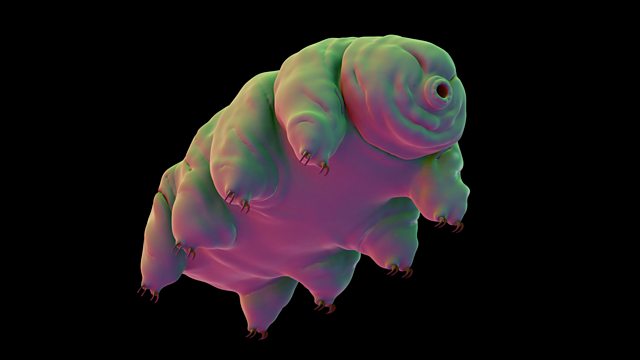Tardigrade
Brett Westwood encounters arguably the world's toughest animal, despite it being less than a millimetre long and extremely cute. From 2017
When Brett Westwood heard he was going to encounter arguably 'the world's toughest animal' he didn't expect to find it on a garage roof in County Durham - but all became clear when he came face to face with the Tardigrade. First described in 1773 and so named because they resemble slow-moving bears, these microscopic animals are probably the closest thing to an alien we are likely to encounter. Capable of living without water and then being revived after 30 years, the Tardigrade or moss-piglet as they are also called, challenge our ideas about what defines life. And as if that wasn't enough, they are probably the cutest little creature you could hope to meet! From 2017
Original Producer in longer form programme : Sarah Blunt.
Reversion archive producer for BBC Audio in Bristol : Andrew Dawes
Last on
![]()
What Are Tardigrades?
Ten tough facts about the sci-fi heroes of the natural world.
Professor Mark Blaxter

Amongst other things, he’s interested in the evolution of development in the moulting animals such as tardigrades. He runs The Blaxter lab at the University of Edinburgh.
Paul Evans

Phil Gates

He has written 17 science books for young people and has won or has been shortlisted for many literary awards. Phil has a strong interest in wildlife conservation and is a former chairman of Durham Wildlife Trust and past President of the Northern Naturalists' Union. He is on the editorial advisory board of BBC Wildlife magazine. His book Spring Fever, published in 1992, was an early prognosis for the impact of climate change on Britain’s flora and fauna that contains a number of predictions that have since been borne out by experience.
Find more from Phil at A Digital Botanic Garden, Beyond the Human Eye, and Cabinet of Curiosites.
Dr Emma Perry

Emma now advises the Marine Biology program at Unity College, raises corals in the wetlab and researches tardigrades with students. Together with her students, Dr Perry explores the land and beaches of Maine looking for tardigrades. She is interested in determining what factors determine where different species of tardigrades are found.
Emma Sherlock

The Earthworm Society of Great Britain and Northern Ireland (ESB) aims to promote and support scientific research so that earthworms and their environment can be better understood.
Through its work the society aims to encourage the conservation of earthworms and their habitats and to educate and inspire people so that these fascinating creatures may continue to be enjoyed in the future. Emma’s enthusiasm for earthworms is hugely infectious and amongst her favourite earthworms is the Fried Egg Earthworm!
William R Miller

Picture: Tardigrade through a microscope by Phil Gates
Broadcasts
- Tue 27 Jun 2017 11:00BBC Radio 4 FM
- Mon 3 Jul 2017 21:00BBC Radio 4
- Sun 19 Dec 2021 06:35BBC Radio 4 FM





